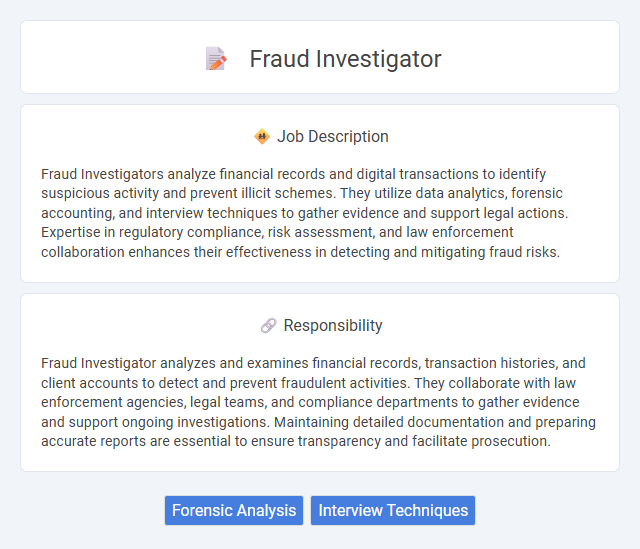
Fraud Investigators analyze financial records and digital transactions to identify suspicious activity and prevent illicit schemes. They utilize data analytics, forensic accounting, and interview techniques to gather evidence and support legal actions. Expertise in regulatory compliance, risk assessment, and law enforcement collaboration enhances their effectiveness in detecting and mitigating fraud risks.
Individuals who exhibit strong analytical skills and a high attention to detail are likely to be well-suited for a Fraud Investigator role. Those who thrive in environments requiring critical thinking, persistence, and ethical judgment probably find this job more compatible with their abilities. People less comfortable with extensive data analysis or working under pressure may face challenges in meeting the demands of this position.
Qualification
A Fraud Investigator requires strong analytical skills, attention to detail, and experience with investigative techniques used to identify and prevent fraudulent activities. Key qualifications include a background in criminal justice, finance, or forensic accounting, along with proficiency in data analysis tools and knowledge of relevant laws and regulations. Certification such as Certified Fraud Examiner (CFE) enhances credibility and demonstrates specialized expertise in fraud detection and investigation.
Responsibility
Fraud Investigator analyzes and examines financial records, transaction histories, and client accounts to detect and prevent fraudulent activities. They collaborate with law enforcement agencies, legal teams, and compliance departments to gather evidence and support ongoing investigations. Maintaining detailed documentation and preparing accurate reports are essential to ensure transparency and facilitate prosecution.
Benefit
A Fraud Investigator position likely offers the benefit of developing critical analytical skills and expertise in detecting and preventing fraudulent activities, which may enhance career prospects in finance and law enforcement sectors. The role probably provides opportunities to work with advanced technologies and investigative tools, increasing professional competence and marketability. Furthermore, a position in this field may offer job stability and competitive compensation due to the high demand for fraud prevention in various industries.
Challenge
Fraud Investigator roles likely involve analyzing complex data to identify suspicious activities, which can present significant challenges due to evolving fraud tactics. The job probably requires maintaining a high level of attention to detail and critical thinking under pressure, as fraud schemes often become more sophisticated. Navigating legal frameworks and coordinating with various departments might add layers of complexity to resolving fraud cases effectively.
Career Advancement
Fraud Investigator roles offer significant career advancement opportunities through gaining expertise in data analysis, risk assessment, and forensic accounting techniques. Progression often leads to senior positions such as Fraud Analyst, Compliance Manager, or Risk Management Director within financial institutions and corporate sectors. Mastery in fraud detection technologies and regulatory compliance enhances prospects for leadership roles and specialized consulting careers.
Key Terms
Forensic Analysis
Fraud Investigator roles involve conducting meticulous forensic analysis to detect and analyze fraudulent activities within financial records, digital transactions, and other data sources. Expertise in forensic accounting, data mining, and investigative techniques enables identification of patterns indicative of fraud, supporting legal actions and regulatory compliance. Proficiency in advanced software tools and report generation enhances the accuracy and effectiveness of fraud detection and prevention strategies.
Interview Techniques
Fraud investigators utilize specialized interview techniques such as open-ended questioning, cognitive interviewing, and behavioral analysis to uncover inconsistencies and obtain truthful information from suspects and witnesses. Employing rapport-building strategies enhances cooperation, while detecting verbal and non-verbal cues helps identify deception during the investigative process. Mastery of these methods is essential for collecting credible evidence and supporting successful fraud detection and prevention.
 kuljobs.com
kuljobs.com